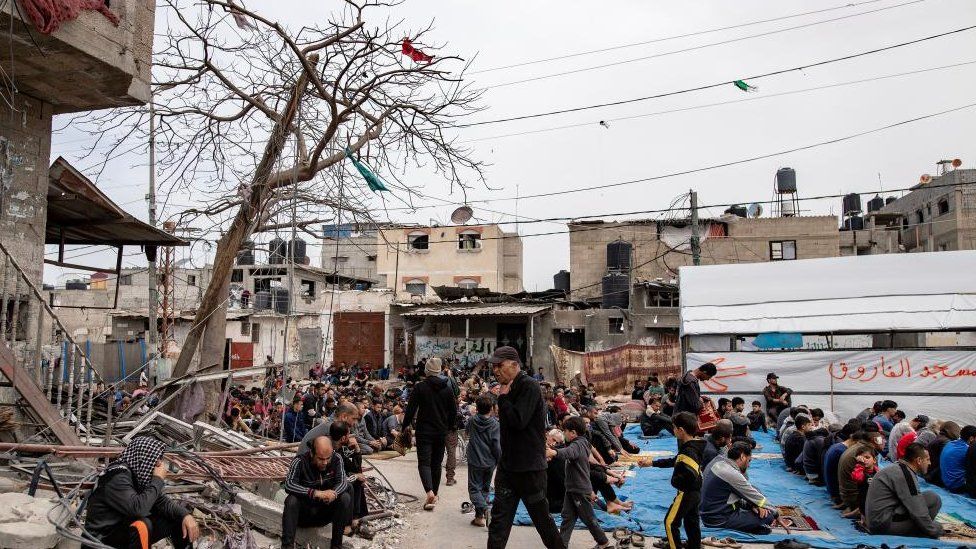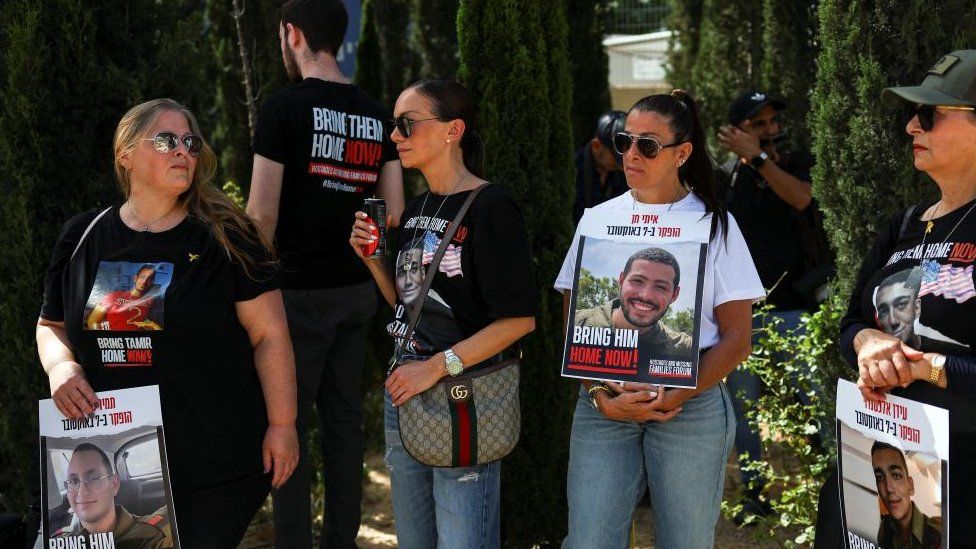 Image source, EPA
Image source, EPADespite a week of tensions with Israel over its conduct of the Gaza War, Washington is reported to have authorised arms transfers to its ally worth billions of dollars.
These include more than 1,800 MK84 2,000lb (900kg) bombs and 500 MK82 500lb bombs, as well as 25 F35A fighter jets, The Washington Post and Reuters news agency have said.
The larger bombs have previously been linked to air strikes in Gaza causing mass casualties.
Washington gives $3.8bn (£3bn) in annual military assistance to Israel.
But the latest package comes as the Biden administration has been raising concerns about rising civilian deaths in Gaza and humanitarian access to the territory, which the UN says is on the verge of famine.
The administration has also said it "cannot support" an anticipated large-scale Israeli ground offensive in Rafah on the Egypt border, where there are more than a million displaced people.
The Palestinian ministry of foreign affairs in Ramallah criticised the US for inconsistencies in its positions.
In a post on X, formerly known as Twitter, it said: "demanding [Israeli Prime Minister Benjamin] Netanyahu to stop killing civilians and supplying him with weapons is an unprecedented principled and moral contradiction".
 Image source, Reuters
Image source, ReutersNews of the arms transfers emerged on the same day that President Joe Biden spoke of "the path being felt by so many in the Arab-American community with the war in Gaza".
The arms transfers have also been strongly criticised by some senior members of the president's Democratic party who have been calling for US military aid to be limited or conditional on changes in how Israel conducts military operations.
The US State Department told the BBC that it was unable to confirm potential or pending US arms transfers before Congress was formally notified.
Quoting Pentagon and State Department officials, the Washington Post reported that the extra warplanes being sent to Israel were initially approved as part of a larger package by Congress in 2008 and had been requested last year – in advance of the deadly 7 October attacks by Hamas which triggered the Gaza war.
When Israel's Defence Minister Yoav Gallant went to Washington last week, it was said he had taken a long list of US weapons his country wanted to receive in an expedited manner.
During the war Israel, though itself a major weapons exporter, has been heavily reliant on American air defences and munitions.
Tens of thousands of bombs have been dropped on Gaza, with military experts saying the aerial campaign has been one of the most intense and destructive in recent history.
Late last year, analysis of bomb craters from satellite imagery drew major US news outlets to conclude that Israel had routinely used its biggest 2000-pound (900kg) bombs.
The New York Times quoted explosives experts who said that while bombs of that size were used by several Western militaries, they were almost never dropped by US forces in densely populated areas anymore.
Meeting top US officials, Mr Gallant stressed the need to preserve his country's qualitative military edge in the Middle East and prepare for a possible escalation in fighting with the powerful Lebanese armed group, Hezbollah.
He also sought to ease tensions with his country's most important ally, which had sunk to their lowest point of the Gaza war after the US abstained from a key UN Security Council vote on Monday.
The Israeli Prime Minister, Benjamin Netanyahu, reacted angrily when this allowed a resolution calling for an immediate ceasefire to pass.
In the wake of the vote, White House spokesman John Kirby had rejected claims that the US had changed its position and denied that it was ready to start conditioning aid to Israel.
"It's not about trying to use some sort of power dynamics here with our good friend and ally, Israel. It's about helping them defend themselves," he told journalists.
"We still have Israel's back. As you and I are speaking, we are still providing tools, capabilities, and weapons systems so that Israel can defend itself against what we agree is still a viable threat [from] Hamas."
Since the new arms transfers were reportedly given the green light, there have been signs that relations between Israel and the US have eased.
A high-level Israeli delegation is now expected to travel to Washington to discuss possible alternative plans for operations against Hamas in Rafah.
The trip had previously been cancelled by Mr Netanyahu in response to the UN Security Council ceasefire vote.
In another step likely to be welcomed by the US, Israel has also agreed to send senior intelligence officials back to Egypt and Qatar for renewed talks to try to release its hostages as part of a possible truce deal with Hamas.
Source: https://www.bbc.co.uk/news/world-middle-east-68698357





